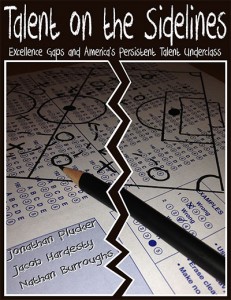 Dr. Jonathan Plucker: Excellence Gaps and the national imperative for equity AND excellence
Dr. Jonathan Plucker: Excellence Gaps and the national imperative for equity AND excellence
Student Success Podcast No. 17, Feb. 28, 2014, recorded Feb 24, 2014
Today’s Guest: Prof. Jonathan Plucker, University of Connecticut
For background, please see the first Student Success Podcast interview with Dr. Jonathan Plucker, Talent on the Sidelines: the Excellence Gap with Dr. Jonathan Plucker or this blog post: Student Success Blogpost: The “Excellence Gap”: income & race disparities persist
Dr. Jonathan Plucker rejoins us to update progress and events since our previous interview in October, 2013 regarding “excellence gaps” as demonstrated by his study, “Talent on the Sidelines.”
In this interview, we focus on the impact of the “Excellence Gap,”on education and our nation, generally, whereby certain minority and socio-economic groups fall behind whites and Asians in measures of academic excellence on test scores by 8th grade (from closer parity in the 3rd grade). As Jonathan says, having “huge portions of our population who are not getting advanced skills, yet they’re clearly capable of having them” is an ethical challenge for us, especially when considering, as he points out, the tremendous impact that would follow “if we even shrank the gaps by half at the top end” which would “drastically transform this country… And yet it’s just not happening.”
Subscribe to Student Success Podcast RSS or find us on iTunes
Guest Biography:
Dr. Plucker received his bachelor’s degree in chemistry from The University of Connecticut in 1991, where he also received a master’s degree in educational psychology in 1992. After briefly serving as an elementary school teacher, he attended the University of Virginia, where he received his doctorate in educational psychology in 1995. After briefly teaching for two years at the University of Maine, he arrived at Indiana University in 1997 as a visiting assistant professor. He become a tenure-track assistant professor in 1998, with promotion to associate professor in 2001 and full professor in 2006.
Dr. Plucker has received a number of honors for his work. For his creativity work, he has received the Daniel E. Berlyne Award for outstanding research by a junior scholar (2001) and the Rudolf Arnheim Award for outstanding research by a senior scholar (2012) from Division 10 of the American Psychological Association, and the 2007 E. Paul Torrance Award for creativity research from the National Association of Gifted Children. For his gifted education research, he has received the NAGC Early Scholar Award (1998) and two awards from the Mensa Education & Research Foundation Award for Excellence in Research (1997 & 2000). For his education policy work, he was ranked in 2011 as one of the Top 100 most influential academics working in education policy.
Dr. Plucker is a fellow of the American Psychological Association (2009) and was named a Fellow of the American Associate for the Advancement of Science in 2011 “for distinguished contributions to the science of creativity and the creation of research-supported education policy.”
Topics Discussed
- Update on progress of Talent on the Sidelines report on policy and education
- Differentiated learning and tracking versus flexible grouping
- Testing indicators and the need for “soft skills” measurements
- Impact of lost talent on individuals and society
- Huge impact that just a small reduction in the “Excellence Gap” would produce
- Flawed history of racism in this country still impactful
- Nation needs to help students of all racial and socio-economic groups reach highest potential
- The need to keep up the discussion, even when it touches upon sensitive topics of race.
See below for detailed Show Notes.
Resources
- Prof. Jonathan Plucker homepage
- Talent on the Sidelines: Excellence Gaps and America’s Persistent Talent Underclass
Credits
Host: Michael L. Bromley
Original Music by Christopher Bromley (copyright 2011, 2013) Background snoring by Stella.
Best Dogs Ever: by Puck, Stella, & Artemis
Stella fills in on this episode with some snoring.
Here for Puck & Stella slideshow
SHOW NOTES
- Jonathan:
- Talent on the Sidelines study gaining traction
- the language is starting to be used by administrators and teachers
- possible use of Excellence Gap language in The Elementary & Secondary Education act
- previous report: slow to roll out, but gained steam after 4-6 months
- Talent on the Sidelines study gaining traction
- Bromley: how do any teachers question these ideas?
- Jonathan:
- there’s some pushback
- “we can’t do it all” — it’s enough to focus on equity without having to worry about excellence, then along comes Johnathn asking to
- most other countries view excellence gaps as important
- new initiatives demand much on teachers
- reform fatigue
- Bromley:
- tried to explain the various sovereignties to a UK observer: unfathomable to her
- so hard to make changes, everything muddled down the various lines
- what about differented learning?
- Jonathan:
- systems claim to teach differentiated but really don’t — knows an administrator who admits that it doesn’t really work
- very difficult, more so than is expected of it.
- it’d be great, but would be easier if we had “flexible ability grouping” but it’s not a topic schools want to discuss
- Bromley: tracking? a dirty word?
- Jonathan:
- it’s not tracking, but often called that
- tracking = evil
- ability grouping = good
- the problem with tracking is that kids get stuck in it, not flexible
- it tends to distinguish between soci-economic groups and skin color, something not okay in this country w/ bad history of racial relations.
- flexible ability grouping is very different; even researchers confuse it with tracking
- so when we bring up “flexible ability grouping”, its a dead end conversation
- people perceive it as defacto segregation by race
- we have to group kids in some way; now it’s by age (arbitrarily)
- so when people say “no grouping” he says, “great, no grade levels any more…” >> so there are some forms of grouping
- flexibile ability grouping, true differientation.. these will help
- it’s not tracking, but often called that
- Bromley:
- schools pretend to accomplish these goals
- but don’t really, instead always have a new program
- why even age grouping?
- Jonathan: because it’s easy
- but if teaching were to be more effecgtive, why not group by ability and not just age
- employers don’t care about age, they care about skills and abilities
- of all the groupings, age makes the least sense
- but we do it, while claiming we never would group students
- but it’s a sensitive topic
- Bromley:
- summer school = a way of accommodating having kids grouped by age who aren’t equally prepared for a class
- and summer school doesn’t teach
- example of Bromley’s son: one teacher tried to get him to learn at his higher ability by giving him a more difficult book to read than the rest of the class. It can be done.
- Bromley: please explain “straight forward indicators”
- Jonathan
- we need better measures
- we used percentage gap measures because they’re there and people find them meaningful
- annual tests are coming soon… and there will be huge discussions about them, but no one will discuss the percentages of advanced scores on those tests
- so there will be no discussion of excellence gaps
- we’re not having the conversation about data that is already here… but it’s invisible
- on radio today, he heard that there are 3 million jobs going unfilled due to lack of skilled workers
- now we have students going into the workforce without those skills, going unemployed
- huge portion of our student population that are capable but are not getting those advanced skills
- anything we can do to shrink those gaps would be hugely powerful
- shrinking the gap by half at the top end = hundreds of thousands of students
- we need to develop some new indicators, but we’ve got more indicators than we know what to do with
- we do need more and better creativity assessments: soft skills assessments for leadership, technological literacy, team and communication skills
- we’ve created an educational system in which people focus on things getting measured, so we need some soft skills measurements
- really concerned that writing is more important than ever before: students use all the new technologies, social media, texting,.. so are writing more than ever
- but we don’t teach writing; reading is a pathway to writing
- we need better, quicker writing assessments for teachers to use
- Bromley:
- as you said before, it’s an ethical challenge to bring up kids to their potential
- but there are also systematic issues that go missing due to this problem
- schools leaving kid’s potential behind, creates irrelevancy and leads to classroom management problems we find everywhere
- we promote those smart kids into failure
- as 9th grade teacher always wondered how they missed so much in K-8.
- our job at A+ Club is to help kids find relevancy and purpose given what they have
- we are trying to raise opportunities for kids, helping them pursue their dreams rather than letting them get ruined by high school
- Jonathan
- the nature of excellence gaps.. can’t shring them to zeor
- but we can shring them by half
- = 3-5% more African-American and Hispanic kids being moved into advanced performances
- these are hundreds of thousands of kids who would be performing at the highest levels
- how can that not be transforming?
- would change school cultures
- would change the schools who don’t have those kids and would force them to complete with schools they are not now worried about
- we’re nearing minority-minority school populations, which means we’re heading that way as a nation
- it’s a very diverse nations
- we cannot survive with our talent only coming from small slices of the population
- this is economic and cultural necessity
- hopefully, as Churchill said, “Americans always do the right thing after they’ve exhausted every other option.”
- remains optimistic, but we need better interventions
- Bromley: moral challeng
- we want equity and fairness
- but, wow, we’re dumbing down college, dumbing down everythin
- this destroys opportunities, destroys live
- un-American to keep opportunities down
- Jonathan:
- this is a great country to live in if you’re talented
- economic, political conditions are fine, not perfect, but if you have talent, it’s a great place to be
- if you don’t have talent, not so much
- we used to attract the best and the brightest, but not happening so much now
- we need to develop talent in the people who are here
- the excellence gap shows the problem we face here
- Bromley
- don’t we object to individual outcomes being tied to race and zip code?
- Jonathan:
- it’s not comfortable to talk about these issues
- this country has a terrible racial history — and not so long ago
- only one generation ago… people alive today lived under Jim Crow laws
- so things like “ability grouping” gets tagged as segregation
- we need to be sensitive to that
- what we are talking about has been used for nefarious reasons, but we have to talk about it, even if it is difficult and emotionally-loaded from our poor history
- we need to address it
- Bromley: if we don’t, we’ll just keep producing same bad outcomes
- Jonathan
- we need to keep spreading the word!


